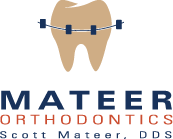When patients find out that braces are in their near future, it spurs a lot of different questions like, “Will they hurt?” “How will I take care of them?” “Will they affect my wisdom teeth?”
Hold on, wisdom teeth?
Yes, wisdom teeth! Even though these might not be big your biggest concern when it comes to braces, we still deal with questions about these guys on a regular basis. Often times, patients who are near the completion of their orthodontic treatment will start to feel their wisdom teeth coming in, and may begin to panic and worry that their now straightened teeth will be moved around and once again become uneven. We at Mateer Orthodontics know this a legitimate concern for both patients and parents, so let’s look at how wisdom teeth affect your smile and separate fact from fiction.
Can They Affect My Straightened Smile?
At around 17-21 years of age, patients can expect their wisdom teeth to begin making an appearance. At the same time, they may feel the slightest shifting of their teeth. This is known as a relapse. Is it coincidence, or is it a result of emerging wisdom teeth?
Interestingly enough, research has shown that wisdom teeth are not the cause of teeth shifting around this age! According to researchers at the University of Iowa, wisdom teeth are not able to exert enough pressure on teeth to cause them to shift. Researchers tested this by putting sensors in between teeth on patients both with and without wisdom teeth. The results? There was no noticeable difference.
So if wisdom teeth aren’t the cause for shifting teeth, that what is?
The biggest reason we feel a shifting in our teeth at this point is because we age.
Yep, just like the rest of our body, our teeth begin to show signs of wear and tear as we get older. Teeth naturally drift and this can cause some overlap, slightly moving them forward. When the teeth overlap, the lower teeth can be pressed in towards the tongue by the upper teeth. During this time there is still some residual jaw growth happening, which can force teeth into not so desirable positions.
If you’ve ever heard Dr. Mateer telling patients to wear their retainer, this is why! Because your retainer is a mold of your teeth when you first got your braces taken off, wearing it on a consistent basis is your best defense against the shifting of your teeth. With the natural pressure from your teeth to start drifting, you’ll lose that smile you’ve worked so hard for! That’s why we can’t stress enough how important it is to keep wearing your retainer post-treatment.
Be Wise About Wisdom Teeth
While your wisdom teeth may not be the cause for teeth shifting, it’s still important to know how they can still affect your overall oral health by learning about some problems they can potentially cause when they erupt, like:
- Sometimes wisdom teeth only partially emerge. If this happens a flap of skin can form, which has a bad habit of trapping food, which in turn can gause gum infections and possible tooth decay.
- Often times there won’t be enough room in your mouth for your wisdom teeth to fully erupt. They are unable to break through to the surface and become stuck in your gums and jaws. This is what’s known as being teeth being impacted.
- Painful cysts can form when the wisdom teeth become impacted. These can cause decay and infections to the surrounding tooth roots.
- If the back of your mouth is particularly crowded, wisdom teeth that come in at an angle will painfully rub against your cheeks.
How to Handle Your Wisdom Teeth
The biggest concern with wisdom teeth is that most patients we see just don’t have enough room for them in their mouth for the wisdom teeth to come in comfortably. And often times even when patients do have enough room for them. They are so far back in the mouth that they are hard to brush and floss them properly, leading to gum disease and oral decay.
Post-Braces
After your braces come off, wearing your retainer in a consistent manner and scheduling an appointment as soon as your wisdom teeth start coming in is the best way to avoid any potential problems. Plan on regular visits with us even after you’ve completed your orthodontic treatment.
To Sum It Up
Problems with overcrowding can generally be diagnosed long before the wisdom teeth erupt and they can be extracted to avoid any of the complications that come along with them. Wisdom teeth can even be removed while wearing braces. No need to worry if they start to appear during your orthodontic treatment. There’s also no need to remove wisdom teeth if there aren’t any problem with your’s, which means not everyone needs or has to have their’s removed. Again, it is paramount to wear your retainer every night once your braces come off. This will keep your teeth nice and straight. If you happen to notice it getting tighter, or it feels like there is a pressure in the back of your mouth, don’t hesitate to schedule a visit with us!
At Mateer Orthodontics, we want you to feel taken care of throughout your treatment with braces and beyond. Our team works hard to give you the smile you’ve always wanted and help you keep it. If you’re in the Commack area and are looking for more information about wisdom teeth and how they can affect your orthodontic treatment, get in touch with us today! We are more than willing to answer any questions you have and would be happy to schedule a free consultation at our office.




